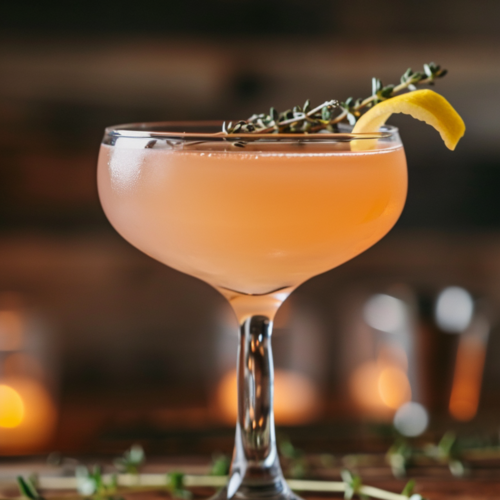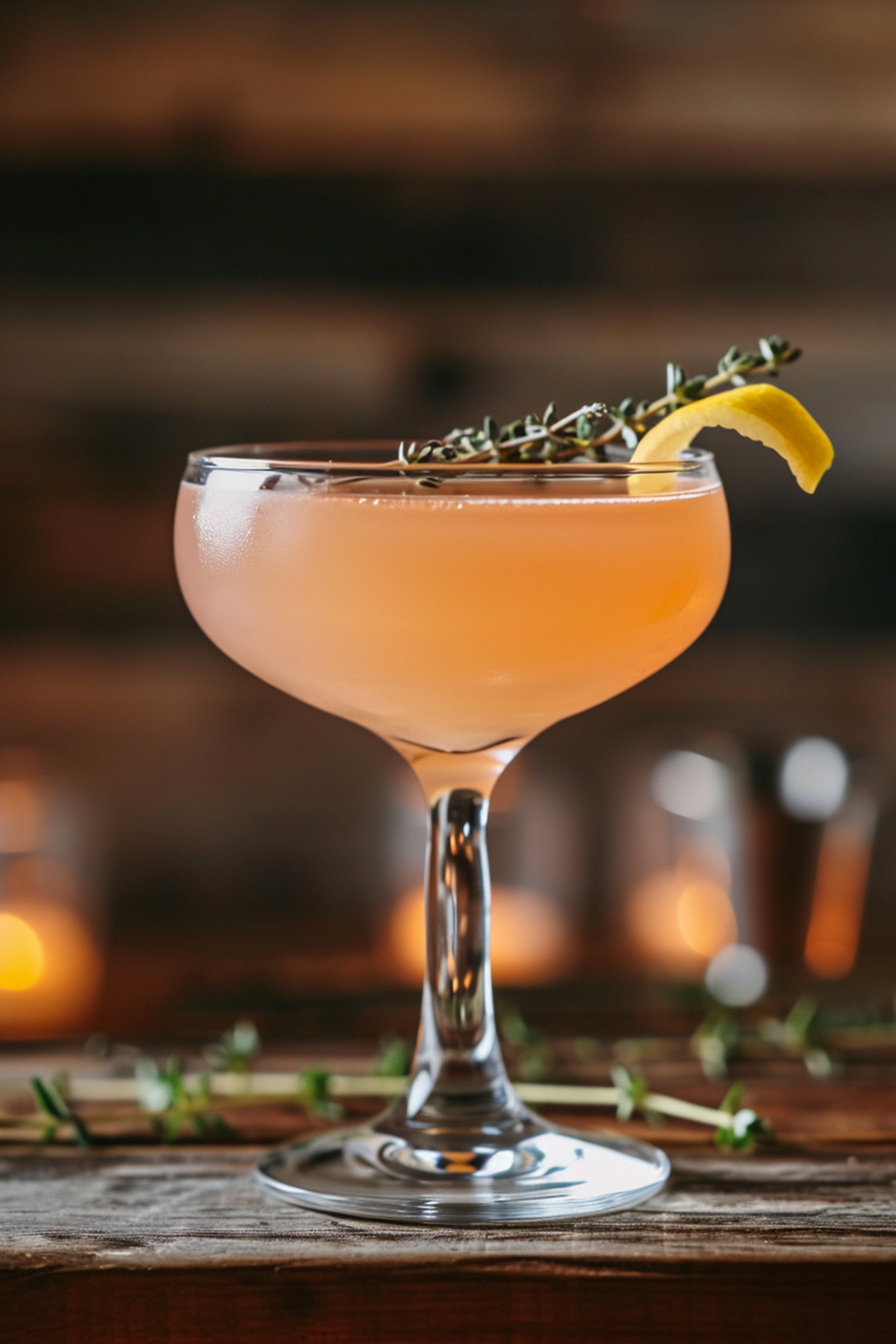Introduction to the Angel Face Cocktail
The Angel Face cocktail is a hidden gem from the 1930s, offering a harmonious blend of gin, apricot brandy, and Calvados. This drink is a testament to the art of mixology, where each ingredient plays a pivotal role in creating a smooth, fruity experience. Its elegance and simplicity have stood the test of time, making it a favorite among connoisseurs.
With its alluring name and delicate balance, the Angel Face is a cocktail that promises sophistication in every sip. Whether you’re a seasoned cocktail enthusiast or new to the world of spirits, this classic concoction is sure to impress. Let’s dive into the world of this exquisite drink and uncover the secrets that make it so special.
Join me as we explore the nuances of the Angel Face, from its intriguing history to the precise art of crafting it. This cocktail is not just a drink; it’s an experience that transports you to a bygone era of elegance and charm.
Key Facts About the Angel Face
- Alcohol Volume: Approximately 24% ABV (48 proof)
- Calories: Approximately 190 kcal
- Preferred Glass: Chilled cocktail glass
- Typical Garnish: None, to preserve the cocktail’s delicate flavors
Interesting Facts about the Angel Face
- The Angel Face is part of the ‘Duo’ and ‘Trio’ cocktail family, where two or three spirits are mixed in equal parts.
- It’s believed to have been first concocted during the American Prohibition era, a time of speakeasies and secret cocktail creations.
- The cocktail’s name suggests an innocence that belies its potent strength and complex flavor profile.

Tasting Notes
The Angel Face offers a symphony of flavors that are both bold and refined. The gin provides a crisp, herbal base, while the apricot brandy imparts a sweet, fruity note. Calvados, an apple brandy from Normandy, adds depth with its rich, woody undertones.
This cocktail is perfect for those who appreciate a drink with a complex flavor profile. It’s ideal for a sophisticated soirée or as a refined end to a gourmet meal. The Angel Face is a versatile cocktail that suits a variety of occasions, from intimate gatherings to grand celebrations.
Its smoothness and subtle sweetness make it accessible, yet it retains a certain mystique that will intrigue the more adventurous palates. If you’re looking to impress your guests or simply indulge in a timeless classic, the Angel Face is a superb choice.
History of the Angel Face
The origins of the Angel Face can be traced back to the glamorous 1930s, a decade known for its innovative cocktail culture. During this time, bartenders were experimenting with new combinations of spirits, leading to the creation of many cocktails we still enjoy today.
While the exact creator of the Angel Face remains a mystery, it’s clear that this cocktail was designed with a discerning drinker in mind. Its inclusion in reputable cocktail guides of the era, such as “The Savoy Cocktail Book,” cements its status as a classic.
The cocktail’s name, Angel Face, is thought to reflect the era’s fascination with the ethereal and divine. It’s a drink that promises purity and innocence, yet delivers a potent punch, much like the cherubic faces that inspired its name.
Angel Face Ingredients
- Gin (1 oz / 30 ml): Provides a crisp, juniper-forward base.
- Apricot Brandy (1 oz / 30 ml): Adds a sweet, fruity complexity.
- Calvados (1 oz / 30 ml): Offers a rich, apple-infused depth.
Did you know?
The Angel Face cocktail is a testament to the art of balance in mixology, where each ingredient is as crucial as the next.

Angel Face Method
Chilling the Glass
Start by placing your cocktail glass in the freezer to chill. A cold glass will ensure the drink maintains its temperature and integrity from the first sip to the last.
Preparing the Mix
Fill a mixing glass with ice cubes to cool the spirits without diluting them excessively. The ice also helps to blend the flavors seamlessly.
Combining the Ingredients
Pour the gin, apricot brandy, and Calvados over the ice. Stir the mixture gently but thoroughly, allowing the ingredients to marry and chill evenly.
Straining the Cocktail
Once the mixture is well-chilled, strain it into the pre-chilled cocktail glass. This step removes the ice, presenting a clear and elegant drink.
Serving Suggestion
The Angel Face is traditionally served in a chilled cocktail glass. The wide brim allows the aromas to reach the nose, enhancing the tasting experience.
No garnish is required for this cocktail, as it could detract from the delicate balance of flavors. However, if you wish to add a touch of elegance, consider a simple twist of lemon peel.
Elevating the Angel Face
- Quality Ingredients: Opt for premium spirits to ensure the best flavor profile.
- Proper Measurement: Use a jigger to measure your ingredients accurately for a perfect balance.
- Stirring Technique: Stir with a bar spoon for about 30 seconds to achieve optimal dilution and chill.

Substitutions and Alternatives for the Angel Face
If you’re missing an ingredient or looking to experiment, consider these substitutions:
- Replace Calvados with another apple brandy or applejack for a similar flavor profile.
- For a less sweet version, try using a dry apricot liqueur instead of apricot brandy.
Similar cocktails include the Sidecar and the Apricot Sour, which share a fruity, brandy-based character.
Add a Twist
Here are a few ways to put a new spin on the Angel Face:
- Add a dash of orange bitters for a hint of citrus complexity.
- Infuse the gin with botanicals like rosemary or lavender for an aromatic twist.
- Experiment with different types of gin, such as Old Tom or Navy Strength, to alter the cocktail’s strength and flavor.
Preferred Liquors for the Angel Face
For the best Angel Face experience, consider these brands:
- Gin: London Dry gins like Beefeater or Tanqueray for their classic profile.
- Apricot Brandy: Giffard or Rothman & Winter for their authentic apricot flavor.
- Calvados: Boulard or Père Magloire for their exceptional quality and taste.
Similar Cocktails to the Angel Face
If you enjoy the Angel Face, you might also like:
- The French Connection, which also features a brandy base.
- The Aviation, another gin-based cocktail with a fruit liqueur component.
- The Corpse Reviver #2, for its complex and herbal flavor profile.
Food Pairings to go with the Angel Face
When it comes to food pairings, consider these options:
- Classic: Cheese platters with a variety of textures and flavors.
- Interesting: Spicy Asian appetizers to contrast the cocktail’s sweetness.
Angel Face FAQs
Here are some common questions and detailed answers:
- Can I shake the Angel Face instead of stirring? Stirring is recommended to maintain clarity and texture.
- What if I don’t have Calvados? Substitute with a quality apple brandy or applejack.
- Is the Angel Face suitable for batch preparation? Yes, but stir the batch with ice before serving and strain into individual glasses.

Angel Face
Equipment
- Mixing glass
- Bar spoon
- Strainer
- Cocktail glass
Ingredients
- 1 oz Gin
- 1 oz Apricot Brandy
- 1 oz Calvados
Instructions
- Fill a mixing glass with ice cubes to chill.
- Pour the gin, apricot brandy, and Calvados over the ice.
- Stir the mixture well until it is thoroughly chilled.
- Strain the drink into a chilled cocktail glass.

